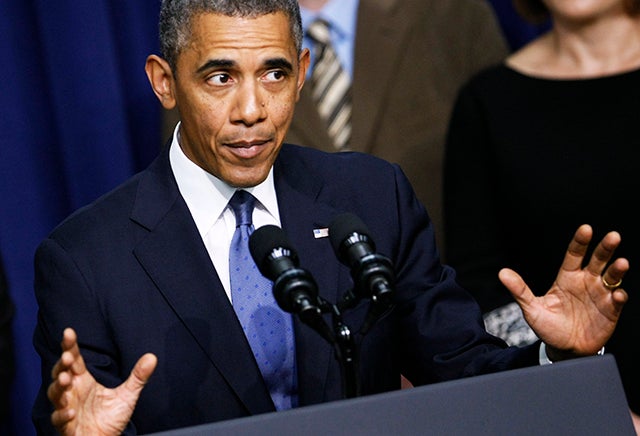Why doesn’t the Obama administration make government employees take responsibility for their mistakes?
Consider Obamacare. You may recall its Web site provided inaccurate information, exposed personal information to others and simply didn’t work. Obama himself admitted in November that “I was not informed directly that the website would not be working the way it was supposed to.”
Oddly, though, two months later few have been held responsible for the failure of the president’s most important initiative. Health and Human Services Secretary Kathleen Sebelius remains on the job. Congress isn’t scrambling to amend the law. The government did drop the contractor CGI Group for its failures, but only after its two-year, $100 million contract ran out.
The slow-motion train wreck of Obamacare continues, unaddressed by the government that created it. In fact, Senate Majority Leader Harry Reid recently exempted members of his staff from having to purchase insurance on Obamacare’s troubled exchanges.
There’s also the IRS scandal. We know the tax collection agency targeted Tea Party groups. Yet rather than investigate, the Obama administration wanted to spin this as a “phony scandal.” Then-acting IRS Commissioner Steven Miller lost his job, but he was leaving anyway.
And there’s Benghazi. More than a year after four Americans were killed, the Senate Intelligence Committee concluded that “this attack was preventable.” The White House says that scandal is “phony” as well. Former Secretary of State Hillary Clinton says she takes responsibility, but that hasn’t kept her from becoming the Democrat frontrunner for president in 2016.
But while they drag their heels at scandalous government behavior, notice how quickly policymakers respond to almost every private-sector incident by rolling out proposals that would increase regulation.
Just consider Sen. Charles Schumer’s (D-N.Y.) attitude toward Target and trains when speaking last month at the left-wing Center for American Progress.
“When a CSX train derails, creating a horrible explosion, do we say let’s shrink or abolish CSX and all railway companies? When Target’s data is breached, do we say let’s shrink and even abolish Target, or get rid of all discount stores?” he asked rhetorically. But his Senate colleagues had already begun using those incidents.
“The recent series of explosions and accidents involving oil trains demands an investigation and review of our current safety practices and regulations,” two Democratic senators declared shortly after a railroad accident. As for Target’s breach, Sen. Patrick Leahy swiftly used it as a reason to reintroduce a bill to create stronger data privacy standards.
But Schumer’s larger point – that we should hold the government responsible, just like private companies are held accountable – has been overlooked.
“A similar standard should apply to government,” he argued. “When government makes mistakes, let’s not ignore them, let’s fix them. Let’s come down hard on the people who messed up. But don’t, as in years past, use it as an excuse to shrink or curtail the many greater and necessary government programs.”
Schumer’s speech was aimed at showing Democrats how to defeat the Tea Party. All he accomplished, though, was to remind Americans just how much we need groups like the Tea Party to keep tabs on a government that cannot restrain itself.
